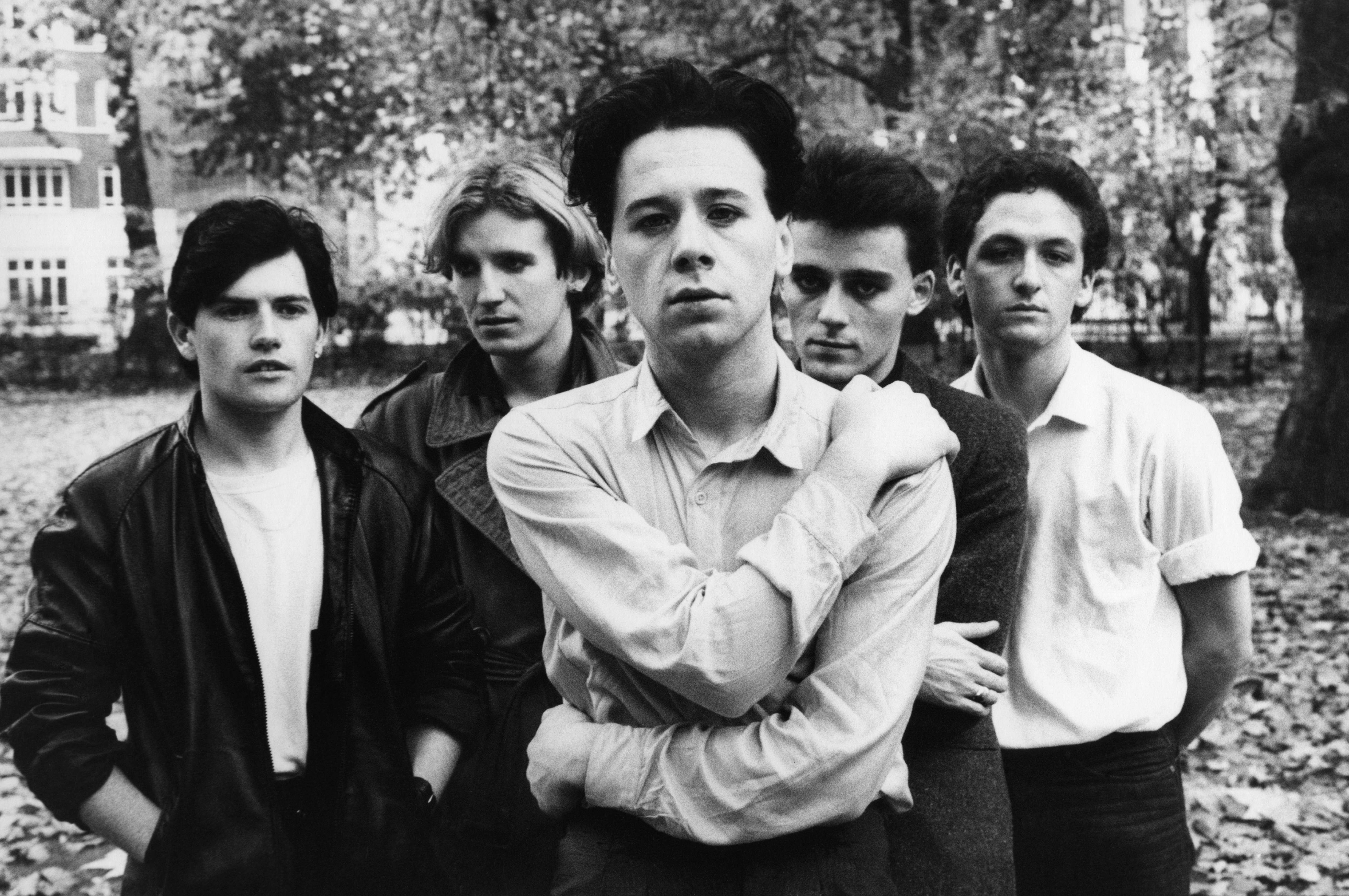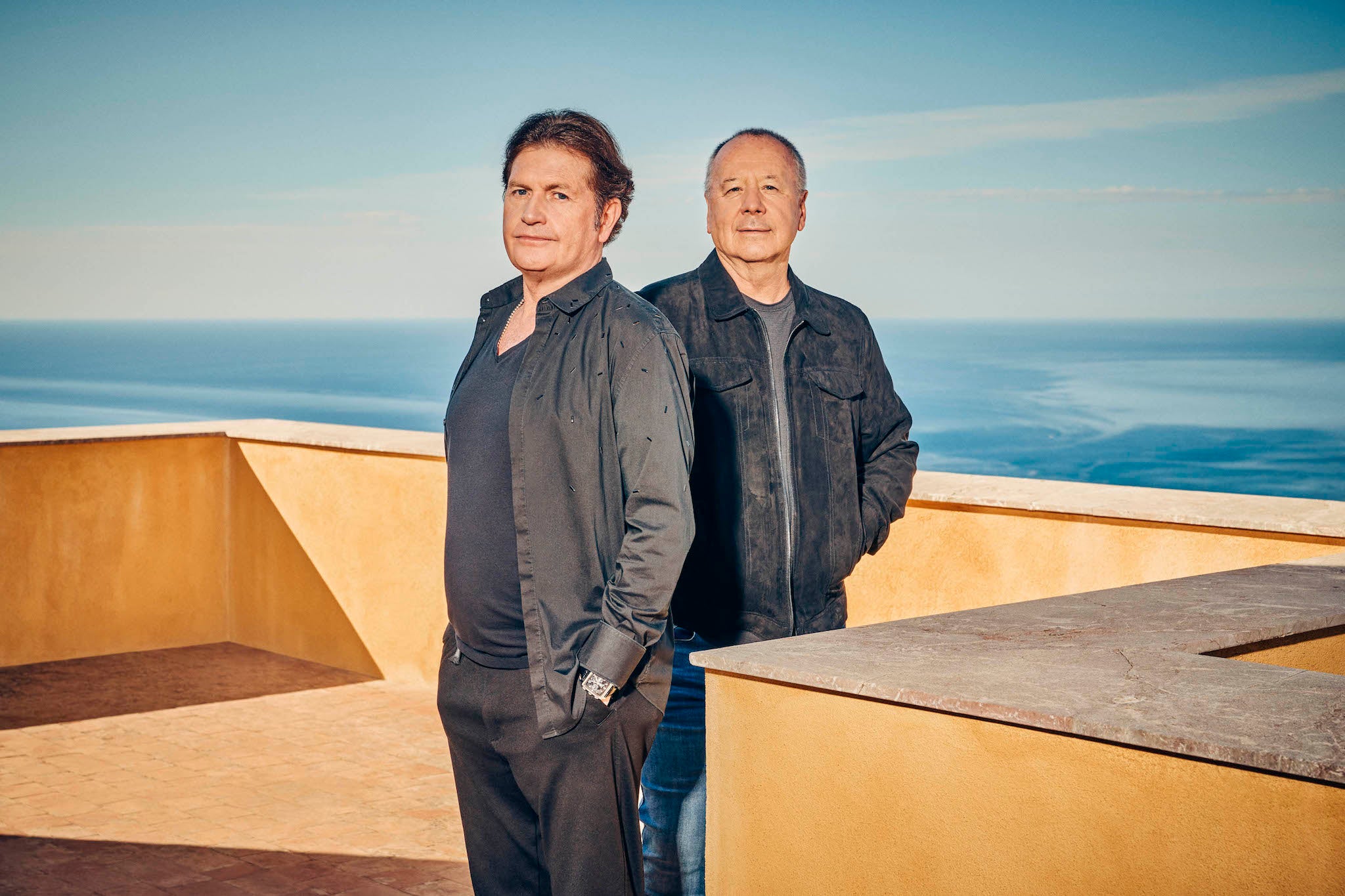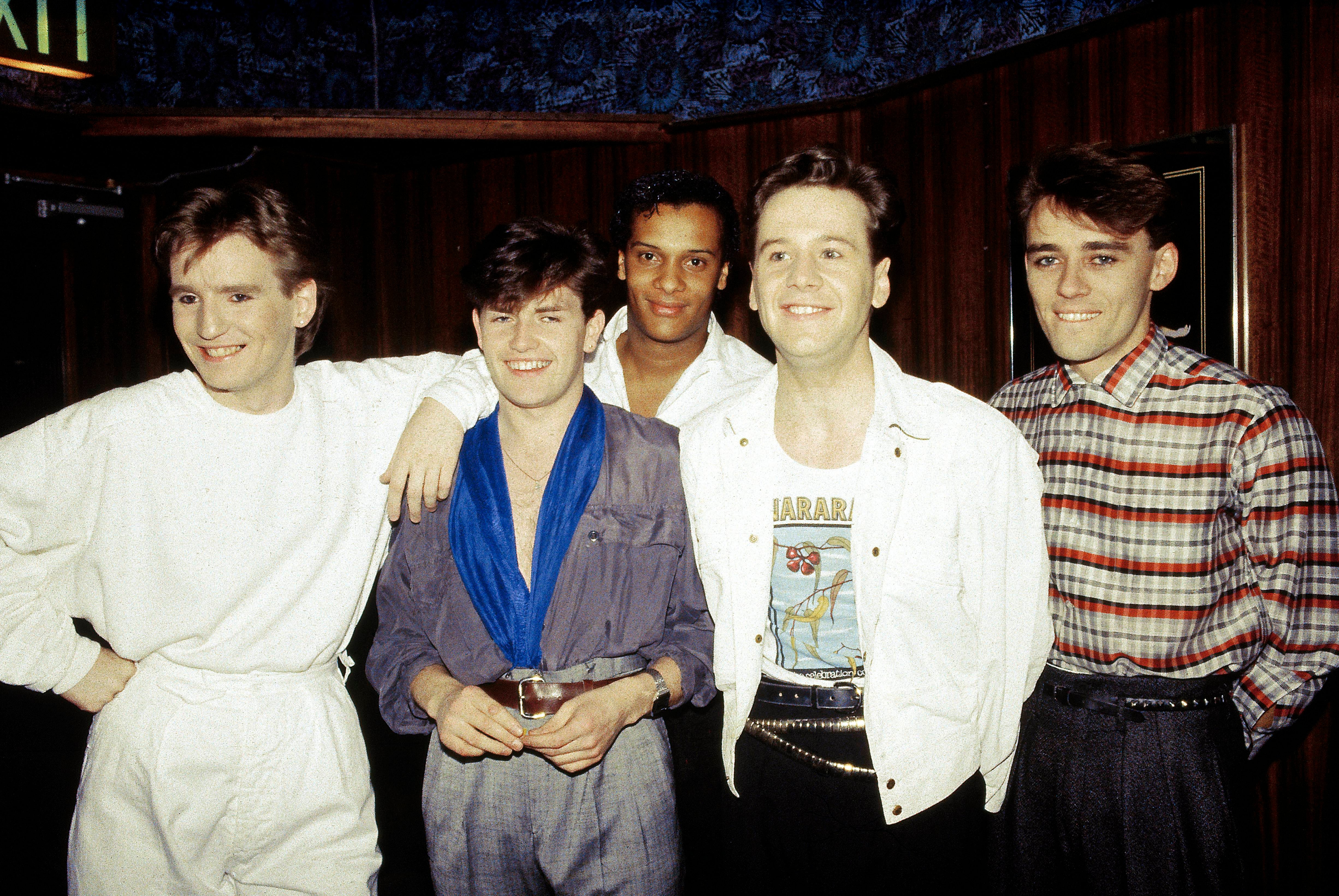Jim Kerr on how Simple Minds came back from the dead – ‘If you hang around long enough, you’re a classic’
After cult electro-pop status and Eighties smashes like ‘Don’t You (Forget About Me)’ and Live Aid, the band’s career took a nosedive in the Noughties. But as their biographer Graeme Thomson finds, they’re suddenly being rediscovered by a new generation

The life of a band that never quits is a curious thing. Over the course of 40 or 50 years, the narrative curves between struggle, success, decline, survival – and, if you’re lucky, revival.
Back in the early 2000s, long after the glow of hit singles such as “Promised You a Miracle”, “Waterfront”, “Don’t You (Forget About Me)”, “Alive and Kicking”, “Belfast Child”, “See the Lights” and huge-selling albums Sparkle in the Rain, Once Upon a Time and Street Fighting Years had faded, the air around Simple Minds was growing thin. The band had been cool once, but nothing erodes cool like massive success. And when that departs – what remains?
Simple Minds’ singer and founder member Jim Kerr remembers the dog days well. “It doesn’t seem that long ago to me that, after climbing the mountain, we were back doing clubs,” says Kerr. “We were off the grid for a long time. There was about a decade where people were asking me, ‘Is the band still going? Are you still in the band?’” He laughs ruefully. “‘No, I’m delivering f***ing bread! I’m back at the plumbing.’
“People don’t say that anymore. The word is out, the perspective has changed. You sell 18,000 tickets in Amsterdam and they ask if you want to do two nights – and nothing has happened; there have been no hits. There’s a point where you’re over the hill and you’re in Alaska and no one wants to know, and then a point where you’re considered authentic. The real deal. It’s all changed for us again.”

Simple Minds are currently undergoing a palpable renaissance, having landed in the sweet spot that lies at the optimum point between the past and the present. While their brilliant, eclectic and experimental pre-hits albums are finally getting the kind of critical appreciation they deserve, the band are also firing on all cylinders in the here and now. Their most recent studio album, Direction of the Heart, garnered strong reviews and a Top 5 chart position. Earlier this year they released a fine live version of their 1982 classic album, New Gold Dream (81-82-83-84).
In 2024, they embark on their biggest worldwide tour since the 1980s, encompassing a night at the O2 in London, two sold-out shows at the Hydro in Glasgow, as well as an appearance at the Isle of Wight Festival in the summer. Europe, the US, New Zealand and Australia will also be visited. “Next year could be our busiest year ever – stretching beyond a year,” says Kerr. “I think we’ll be able to put out a new record, as well. We had a live album this year, a studio album last year. We’re giving those early days a run for their money in terms of productivity.”
Before all that, on Friday, a feature-length documentary about the band called Everything Is Possible airs on Paramount+. “The idea didn’t come naturally to us,” says Kerr. “We have a great story, and a great story needs a great ending. But we’re not at the ending – yet. Getting there, maybe. Of course, when you go on stage, you’re playing songs you’ve written throughout your life, and harking back to that, but in general we’ve never been that comfortable looking back. However, there was pressure to do a documentary because everyone does one, and if we didn’t do it, someone else would, and it wouldn’t quite be the thing that we’d want to deliver.
“The big thing for us was, how are they going to capture the atmosphere of those days and those times? I think [director] Joss [Crowley] captured the atmosphere well. I like the authenticity and the fact that there seems to be a humility that we felt was important.”
Simple Minds formed in Glasgow at the tail end of 1977, and the heart of the band still lies in its two founding members, Kerr and guitarist and co-writer Charlie Burchill. Childhood friends who lived in the same housing scheme in Glasgow as kids, now reside on the same street in Taormina, Sicily. “It’s a story about autodidacts and stammerers finding a voice,” says Kerr, who had a pronounced stutter when he was younger. “Inventing our own language, inventing ourselves. It’s about a band, and it’s about a duo. Let’s be honest: in most groups, despite what everyone else brings to it, a lot of it is about two people.”

It was Kerr and Burchill who stayed the course as Simple Minds evolved away from their cool, culty beginnings. By 1985, following the departures of drummer Brian McGee and bassist Derek Forbes, their sound had become muscular, anthemic. At the behest of their US record company, one afternoon they recorded “Don’t You (Forget About Me)” – a song they didn’t write – for The Breakfast Club film soundtrack. Kerr describes its subsequent global success as a “40-foot free kick that takes a deflection and flies into the top corner”.
The song, a US number one in the summer of 1985, changed everything. In the film, Kerr is candid about his ambitions to see how far Simple Minds could travel – and also about finally making decent money. In the second half of the Eighties they were ubiquitous. They filled stadiums, played Live Aid and Mandela Day, and had their first UK number one with “Belfast Child”, a song that typified Kerr’s newfound interest in making social comment via his lyrics.
From this peak, they began to fall. America quickly lost interest. Original keyboardist Mick MacNeil left the band. While U2 succeeded in reinventing themselves in the 1990s, Kerr and Burchill struggled to find a contemporary sound and place for Simple Minds. Kerr recalls their sole Glastonbury performance, in 1995. “We were awful. It was a point where the spirit was really at a low ebb, and we felt it.” The singer, who had married Chrissie Hynde in 1984, arguably became better known in the Nineties for his second marriage to Patsy Kensit. With their critical and commercial standing flatlining, Simple Minds were dropped by Virgin and considered whether to continue.

How did they reverse this nosedive? Lots of reasons, says Kerr, but time and chance have played their parts. “I think if there’s a quality there, people will rediscover it, but first of all you’ve got to go away for a bit,” he says. “It happens in architecture, it happens with cars. You can be an old jalopy, and if you hang around long enough, you’re a classic. The 5x5 tour in 2012 [where the band played only songs from the first five albums] was a masterstroke in terms of reframing us, and credit for that goes to our manager, Ian Grenfell. Him working with us brought a new confidence. For the longest time we didn’t have a team on our side. Now we have a great team, and a great band.”
Greater critical recognition and the appreciation of fellow artists has also been significant. You hear Simple Minds all over the place these days, the hits sitting happily alongside the misses. While “Alive and Kicking” pumps out on Radio Two, 1980 electro-rock classic “I Travel”, has become a 6Music staple. The last Suede album, Autofiction, sounds a lot like early Simple Minds in places. New band Sugar Horses have been dropping their name in interviews, citing the big mid-Eighties anthems as an influence. Horrors and Chvrches are long-term fans.
We were awful [at Glastonbury in 1995]. It was a point where the spirit was really at a low ebb, and we felt it.
For my recent book on the band, Themes for Great Cities, I spoke to die-hard Simple Minds aficionados such as Manic Street Preachers’ James Dean Bradfield, Primal Scream’s Bobby Gillespie and Mogwai’s Stuart Braithwaite. “That old NME thing about being cool or uncool has kind of gone,” Braithwaite told me. “Everyone has a different path to where they get to. I know there are people who only like the big, bombastic Simple Minds, but it’s cool that they’ve got these beginnings in the art-rock scene, in the new wave and Goth scenes. You start to realise that they’ve got this fantastically rich heritage beyond their big hits.”
Catherine Anne Davies, who performs to critical acclaim as The Anchoress, was part of Simple Minds’ touring band between 2014 and 2018. “As a younger generation, you’re not always aware of the huge impact Simple Minds had on the music that you love, such as my favourite band, Manic Street Preachers,” she says. “I wasn’t really too aware of them beyond, ‘Don’t You (Forget About Me)’, but learning 80 songs for the first tour that I joined in 2014, I got to know the depth and breadth of their back catalogue. It’s hugely enjoyable.”

There is also a gathering tide of wider kudos from across the culture. Kerr recently presented a programme on Radio 4, while the documentary features Trainspotting author Irvine Welsh eulogising about the band. Another huge fan is fellow writer, Alan Warner.
“What a band!” says the award-winning author of Morvern Callar. Warner’s first Simple Minds album was their second, the wonderfully eccentric Real to Real Cacophony, released in 1979. “Derek Forbes was my hero, with those circular, mathematical bass lines,” he says. “Very simple but complex in thought, with stunning groove. Simple Minds had poetry and the avant-garde. The Empires and Dance album, in 1980, was incredible and seemed to tie perfectly in with my early reading of Franz Kafka and [Hans Magnus] Enzensberger; Gunter Grass and Heinrich Böll; Georgio de Chirico and wide Euro plazas.”
Despite an infatuation with Simple Minds’ arty early days, Warner is at pains to counter the idea that the group was only really good until New Gold Dream, after which they were lost to the lure of stardom and stadium rock. “It’s too easy to pull down the curtain in 1982,” he says. “I hate coolness and fashion, and great moments continued: listen to ‘My Life’, which is on [the 1995 album] Good News from the Next World. Astonishing song. Jim Kerr had a solo album called Lostboy! in 2010, with a tune called ‘Shadowland’, which could have taken Simple Minds to number one in a sane world. Even their recent cover of ‘Let the Day Begin’ was an earth-shifting moment of positivity that should have taken them up the charts. It has that kind of pan-religiosity, that sense of potential grace, which seeped through ‘New Gold Dream’ and ‘Belfast Child’.”

Catherine Anne Davies agrees, citing more recent Simple Minds songs such as “Stay Visible” and “Stars Will Lead the Way” as favourites, deserving of a place alongside early classics like “Pleasantly Disturbed” and “Celebrate”. “I remember being in rehearsals and being acutely aware of the talent of songwriters that could produce hits, as well as the nuance of those early albums – but also the later stuff,” she says. “Not many songwriters have that ability to grow and change, or have that ambition. Going through the motions is something you could never accuse Simple Minds of. They don’t get enough credit for that. It’s very hard to hold on to that after so many years of doing it.”
As for Kerr, despite the retrospective nature of the documentary, he is very much focused on Simple Minds’ busy, bustling present. He has one eye on the future, too. “Marathon runners always keep something for the end, a real energy boost, because you want to look great going over the finish line,” he says. “I think that’s our approach now to the things we do: we want to look great going over the finishing line. It might only be important to Charlie and me, but that’s the attitude behind it. I don’t think we’ve ever known how to go half measures on anything, and we certainly don’t want to be half-arsed just because we’re nearly 50 years in. We really care. And we don’t want to let the side down.”
‘Everything is Possible’ is available to view on Friday on Paramount+. Simple Minds are touring the UK in March. Details at www.simpleminds.com/tour






Join our commenting forum
Join thought-provoking conversations, follow other Independent readers and see their replies
Comments